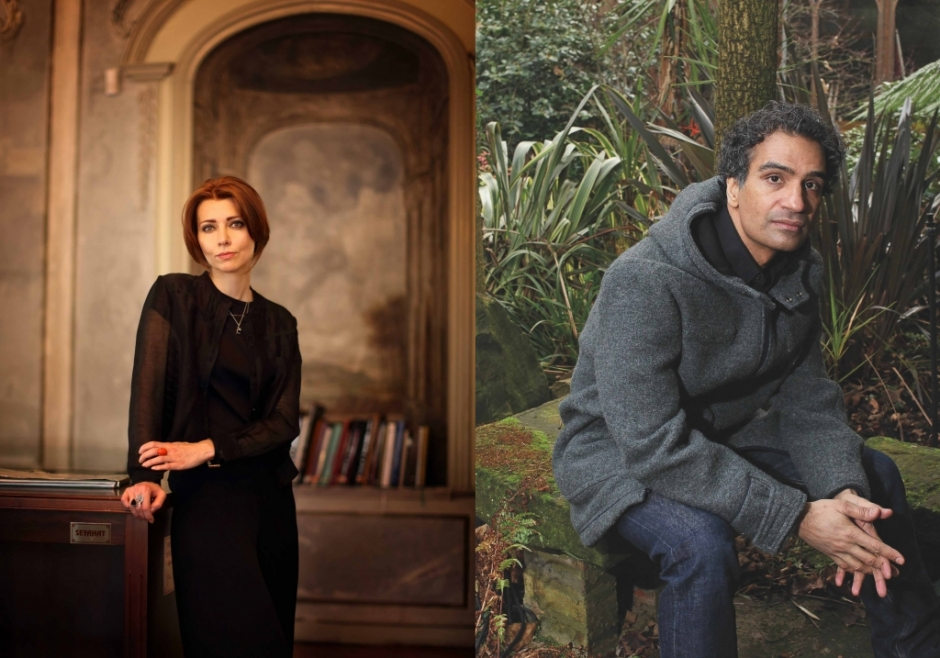Elif Shafak & Nadeem Aslam, Central Library, 15 October 2017.
It’s just gone 1.30 pm and already there’s a sizeable crowd gathered outside Manchester’s Central Library. The talk doesn’t begin till 2pm, but the audience are keen to get inside and secure front row streets. When Elif Shafak, Nadeem Aslam, and Erica Wagner, our chair for the event, walk on to the stage, there’s a burst of excited applause from the audience.
Erica Wagner introduces our writers who between them have garnered an impressive number of awards and nominations.
Writing as they are, at ‘the turn of the century,’ a phrase Wagner takes much delight in using, both writers deal with the very human, the very central, concerns of identity, and with what it means to be an individual with an independent perspective in our contemporary society.
There is little preamble as Wagner dives straight in with her first question, directed at both writers: Literature is a public act and a powerful instrument against injustice. There is a concern about how the world being what it is, there seems to be this urgency for news, it feels like it’s possible to forget about the presence of literature as a public act.
For Aslam, the answer to this question is rooted in a particular incident. He recounts the Virak Mendis story, a Sri Lankan refugee, who, in the late 1980’s, sought sanctuary in a Church until police stormed it: ‘It was moment of great moral crisis. Someone had graffitied ‘Viraj Mendis will not go,’ after his deportation, the ‘go’ was replaced with ‘be forgotten’. I kept a journal and I wrote: this is the kind of novels I will write. First, the resistance we won’t go, we won’t let the world do this to us, then the defeat, and third, we won’t be forgotten.’
As he talks, Shafak and Wagner are nodding their heads in agreement, there are murmurs of ‘yes’, and ‘I remember that’, from the audience, many of who clearly know this story.
For Shafak, it’s about creating spaces, ‘I open up spaces, I like it when we ask questions and leave it to the readers. The questions cannot not be political. It’s about giving more voice, bringing the periphery to the centre – so minorities play a central role. There’s a multiplicity of voices.’
This challenge, to present alternative views has been a constant for Shafak in her literary career, and it’s why her writing is so often seen as contentious.
‘Writing fiction has never been auto-biographical for me,’ Shafak continues, ‘I’m much more interested in not being myself – my life is very boring (this makes the audience laugh). This empathy, the journey of putting yourself in another’s space – those are the intellectual and spiritual journeys that interest me. We have this multiplicity of voice inside us, but we try to suppress it.’ She quotes Adorno, ‘“intolerance of ambiguity is a sign of an authoritarian mind,” we have become so accustomed to duality, but it’s a clash between two certainties, there is very little room for nuances. Fiction can only ask questions, why not a fifth way, or an eighth way? We don’t have to limit ourselves. The novel as a genre, the art of storytelling, speaks to our inner space.’
There’s a break in the talk as Aslam reads from the opening of The Golden Legend.
After, Wagner, careful not to throw in spoilers, questions Aslam on his protagonist Nargis and the way in which her past identity is something she, almost inadvertently, moves away from.
Aslam: I was thinking of Sylvia Plath’s line, ‘I am, I am, I am,’ in mind here. It’s linked, in a way to what I was trying to hint at – what does identity mean in a society where there’s so much pressure to say ‘I am’, it’s linked to the keys in the novel. This is my attempt to try to understand how one thing in the world is created by another. Maybe as we get older, we will see how we are all connected, ‘knowing’ without ‘seeing’, so we can weave a story around those invisible connections – make the invisible visible.
Wagner: I was thinking, there’s this magical place, this extraordinary Island in The Golden Legend, and there’s Oxford, in The Three Daughters of Eve, both seem to be magical spaces of freedom of thought, how did you feel about these spaces?
Aslam: I’ve always said my rivers are imaginary, but the fish are real (cue more laughter from the audience). Islands do exist like this. I was thinking of Lindisfarne, the first island said to be attacked by Vikings, that village and the idea of having a safe space, where gravity would not be a presence – somewhere safe.
Shafak: I wanted to understand how a girl like Peri, for the first time coming to Oxford, would feel, and the contrast of being in this place compared to her home in Turkey – it’s everything. Our past, is full of ruptures, but in Oxford there is continuity. It interests me – the way fiction can give another side to what is the history of a space.
There’s second break as Shafak takes the stand and reads from The Three Daughters of Eve. She chooses a section from the beginning of the novel where the narrator comments on the gulf between her parents – it’s that duality at play, the father’s secularism vs. the mother’s increasing religiosity. Peri, the youngest child and only daughter, is caught in the middle.
Shafak elucidates: Peri is the confused one of the three friends in the novel. There’s the secular one, the believer, and the confused. I wanted the Turkish one to be the confused – because we are, we are polarised – we forget our history. Peri represents Turkey. I want to focus on the micro-histories, it’s important to allow yourself to ask questions – What happened?
And on this note, Wagner opens the floor for questioning.

